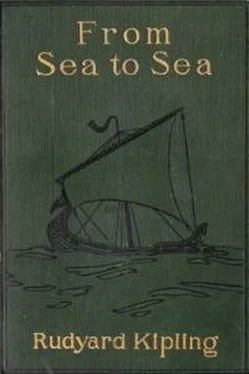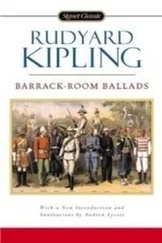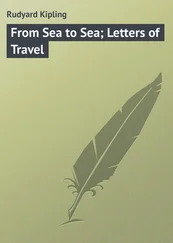Джозеф Киплинг - From Sea to Sea
Здесь есть возможность читать онлайн «Джозеф Киплинг - From Sea to Sea» весь текст электронной книги совершенно бесплатно (целиком полную версию без сокращений). В некоторых случаях можно слушать аудио, скачать через торрент в формате fb2 и присутствует краткое содержание. Год выпуска: 2014, Издательство: epubBooks Classics, Жанр: Биографии и Мемуары, Публицистика, на английском языке. Описание произведения, (предисловие) а так же отзывы посетителей доступны на портале библиотеки ЛибКат.
- Название:From Sea to Sea
- Автор:
- Издательство:epubBooks Classics
- Жанр:
- Год:2014
- ISBN:нет данных
- Рейтинг книги:3 / 5. Голосов: 1
-
Избранное:Добавить в избранное
- Отзывы:
-
Ваша оценка:
- 60
- 1
- 2
- 3
- 4
- 5
From Sea to Sea: краткое содержание, описание и аннотация
Предлагаем к чтению аннотацию, описание, краткое содержание или предисловие (зависит от того, что написал сам автор книги «From Sea to Sea»). Если вы не нашли необходимую информацию о книге — напишите в комментариях, мы постараемся отыскать её.
From Sea to Sea — читать онлайн бесплатно полную книгу (весь текст) целиком
Ниже представлен текст книги, разбитый по страницам. Система сохранения места последней прочитанной страницы, позволяет с удобством читать онлайн бесплатно книгу «From Sea to Sea», без необходимости каждый раз заново искать на чём Вы остановились. Поставьте закладку, и сможете в любой момент перейти на страницу, на которой закончили чтение.
Интервал:
Закладка:
He had been so happy in the thought of "getting home by Christmas," and so charmingly communicative as to the members of his family for whom such and such gifts were intended, that the Englishman cut short the record of fraud and soothed him by saying that he had not been so very badly "done," after all. This consideration was misplaced, for, his peace of mind restored, the Young Man from Manchester looked out of the window and, waving his hand over the Empire generally, said: "I say. Look here. All those wells are wrong, you know!" The wells were on the wheel and inclined plane system; but he objected to the incline, and said that it would be much better for the bullocks if they walked on level ground. Then light dawned upon him, and he said: "I suppose it's to exercise all their muscles. Y' know a canal horse is no use after he has been on the tow–path for some time. He can't walk anywhere but on the flat, y' know, and I suppose it's just the same with bullocks." The spurs of the Aravalis, under which the train was running, had evidently suggested this brilliant idea which passed uncontradicted, for the Englishman was looking out of the window.
If one were bold enough to generalise after the manner of Globe–trotters, it would be easy to build up a theory on the well incident to account for the apparent insanity of some of our cold weather visitors. Even the Young Man from Manchester could evolve a complete idea for the training of well–bullocks in the East at thirty seconds' notice. How much the more could a cultivated observer from, let us say, an English constituency, blunder and pervert and mangle? We in this country have no time to work out the notion, which is worthy of the consideration of some leisurely Teuton intellect.
Envy may have prompted a too bitter judgment of the Young Man from Manchester; for, as the train bore him from Jeypore to Ahmedabad, happy in his "getting home by Christmas," pleased as a child with his Delhi atrocities, pink–cheeked, whiskered, and superbly self–confident, the Englishman whose home for the time was a dark bungaloathsome hotel, watched his departure regretfully; for he knew exactly to what sort of genial, cheery British household, rich in untravelled kin, that Young Man was speeding. It is pleasant to play at Globe–trotting; but to enter fully into the spirit of the piece, one must also be "going home for Christmas."
II
Shows the Charm of Rajputana and of Jeypore, the City of the Globe-trotter. of Its Founder and Its Embellishment. Explains the Use and Destiny of the Stud-bred, and Fails to Explain Many More Important Matters
If any part of a land strewn with dead men's bones have a special claim to distinction, Rajputana, as the cock–pit of India, stands first. East of Suez men do not build towers on the tops of hills for the sake of the view, nor do they stripe the mountain sides with bastioned stone walls to keep in cattle. Since the beginning of time, if we are to credit the legends, there was fighting—heroic fighting—at the foot of the Aravalis and beyond, in the great deserts of sand penned by those kindly mountains from spreading over the heart of India. The "Thirty–six Royal Races" fought as royal races know how to do, Chohan with Rahtor, brother against brother, son against father. Later—but excerpts from the tangled tale of force, fraud, cunning, desperate love and more desperate revenge, crime worthy of demons and virtues fit for gods, may be found, by all who care to look, in the book of the man who loved the Rajputs and gave a life's labours in their behalf. From Delhi to Abu, and from the Indus to the Chambul, each yard of ground has witnessed slaughter, pillage, and rapine. But, to–day, the capital of the State, that Dhola Rae, son of Soora Singh, hacked out more than nine hundred years ago with the sword from some weaker ruler's realm, is lighted with gas, and possesses many striking and English peculiarities.
Dhola Rae was killed in due time, and for nine hundred years Jeypore, torn by the intrigues of unruly princes and princelings, fought Asiatically.
When and how Jeypore became a feudatory of British power and in what manner we put a slur upon Rajput honour—punctilious as the honour of the Pathan—are matters of which the Globe–trotter knows more than we do. He "reads up"—to quote his own words—a city before he comes to us, and, straightway going to another city, forgets, or, worse still, mixes what he has learnt—so that in the end he writes down the Rajput a Mahratta, says that Lahore is in the Northwest Provinces, and was once the capital of Sivaji, and piteously demands a "guide–book on all India, a thing that you can carry in your trunk y' know—that gives you plain descriptions of things without mixing you up." Here is a chance for a writer of discrimination and void of conscience!
But to return to Jeypore—a pink city set on the border of a blue lake, and surrounded by the low, red spurs of the Aravalis—a city to see and to puzzle over. There was once a ruler of the State, called Jey Singh, who lived in the days of Aurungzeb, and did him service with foot and horse. He must have been the Solomon of Rajputana, for through the forty–four years of his reign his "wisdom remained with him." He led armies, and when fighting was over, turned to literature; he intrigued desperately and successfully, but found time to gain a deep insight into astronomy, and, by what remains above ground now, we can tell that whatsoever his eyes desired, he kept not from him. Knowing his own worth, he deserted the city of Amber founded by Dhola Rae among the hills, and, six miles further, in the open plain, bade one Vedyadhar, his architect, build a new city, as seldom Indian city was built before—with huge streets straight as an arrow, sixty yards broad, and cross–streets broad and straight. Many years afterward the good people of America builded their towns after this pattern, but knowing nothing of Jey Singh, they took all the credit to themselves.
He built himself everything that pleased him, palaces and gardens and temples, and then died, and was buried under a white marble tomb on a hill overlooking the city. He was a traitor, if history speak truth, to his own kin, and he was an accomplished murderer; but he did his best to check infanticide, he reformed the Mahometan calendar; he piled up a superb library and he made Jeypore a marvel.
Later on came a successor, educated and enlightened by all the lamps of British Progress, and converted the city of Jey Singh into a surprise—a big, bewildering, practical joke. He laid down sumptuous trottoirs of hewn stone, and central carriage drives, also of hewn stone, in the main street, he, that is to say, Colonel Jacob, the Superintending Engineer of the State, devised a water supply for the city and studded the ways with standpipes. He built gas works, set afoot a School of Art, a Museum—all the things in fact which are necessary to Western municipal welfare and comfort, and saw that they were the best of their kind. How much Colonel Jacob has done, not only for the good of Jeypore city but for the good of the State at large, will never be known, because the officer in question is one of the not small class who resolutely refuse to talk about their own work. The result of the good work is that the old and the new, the rampantly raw and the sullenly old, stand cheek–by–jowl in startling contrast. Thus, the Sacred Bull of Shira trips over the rails of a steel tramway which brings out the city rubbish; the lacquered and painted cart behind the two little stag–like trotting bullocks catches its primitive wheels in the cast–iron gas–lamp post with the brass nozzle atop, and all Rajputana, gayly clad, small–turbaned swaggering Rajputana, circulates along the magnificent pavements.
The fortress–crowned hills look down upon the strange medley. One of them bears on its flank in huge white letters the cheery inscription, "Welcome!" This was made when the Prince of Wales visited Jeypore to shoot his first tiger; but the average traveller of to–day may appropriate the message to himself, for Jeypore takes great care of strangers and shows them all courtesy. This, by the way, demoralises the Globe–trotter, whose first cry is, "Where can we get horses? Where can we get elephants? Who is the man to write to for all these things?"
Читать дальшеИнтервал:
Закладка:
Похожие книги на «From Sea to Sea»
Представляем Вашему вниманию похожие книги на «From Sea to Sea» списком для выбора. Мы отобрали схожую по названию и смыслу литературу в надежде предоставить читателям больше вариантов отыскать новые, интересные, ещё непрочитанные произведения.
Обсуждение, отзывы о книге «From Sea to Sea» и просто собственные мнения читателей. Оставьте ваши комментарии, напишите, что Вы думаете о произведении, его смысле или главных героях. Укажите что конкретно понравилось, а что нет, и почему Вы так считаете.












